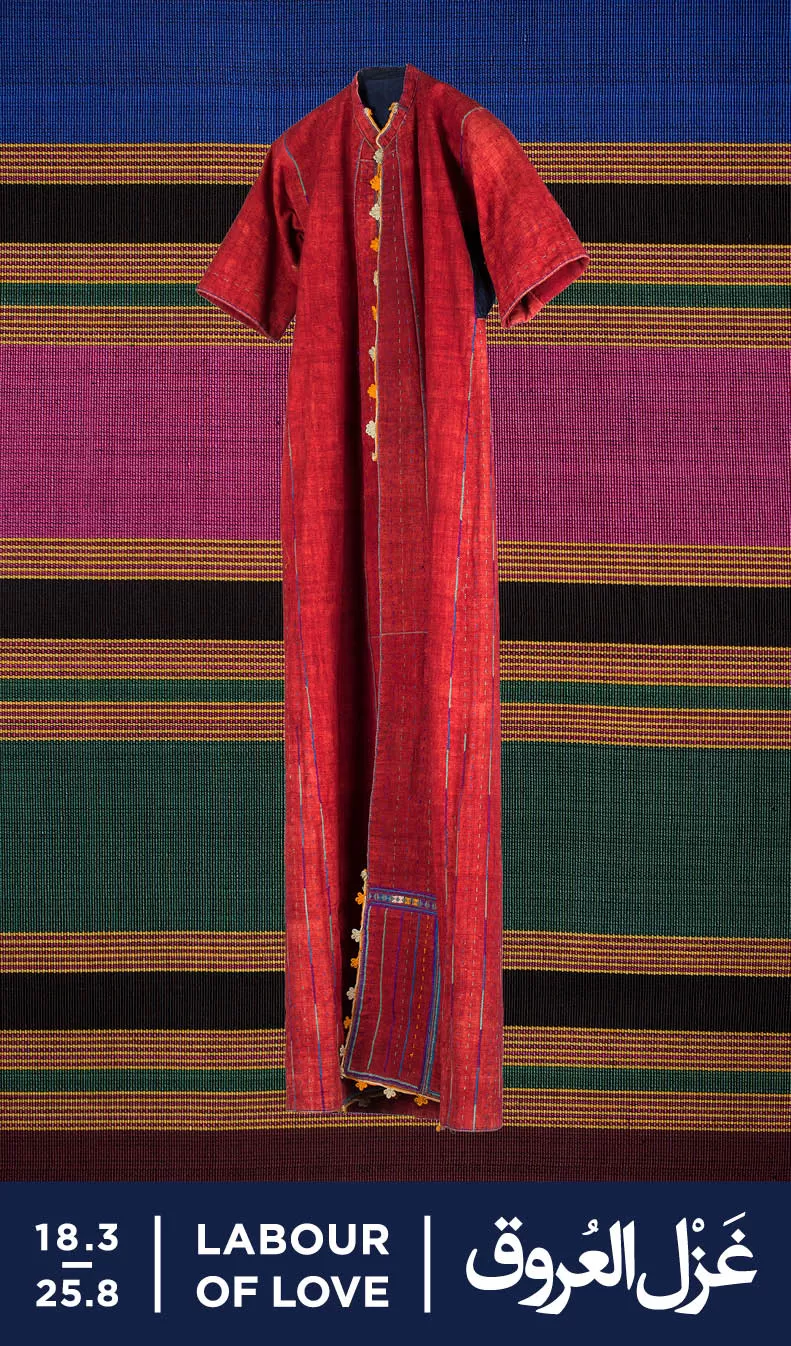
The Palestinian Museum is thrilled to announce the launching date of its forthcoming exhibition, Labour of Love: New Approaches to Palestinian Embroidery, March 18-August 25, 2018, and a press conference will be held on March 17, 2018.
In a moment of heightened global conversation around women’s rights and dominion over their bodies, Labour of Love explores Palestinian embroidery through the lenses of gender, labour, symbol, commodity and class. Structured around these thematic poles, the exhibition traces Palestinian embroidery’s shift from an historic, individual practice, associated with self-expression, to a cultural artefact and marker of national heritage. The exhibition examines the politicisation of Palestinian embroidery, its circulation as image in paintings and posters, the implications of its commodification, and the nature of its production by NGOs today.
The second exhibition by curator Rachel Dedman for the Palestinian Museum, Labour of Love expands upon the Museum’s 2016 satellite exhibition, At the Seams: A Political History of Palestinian Embroidery, Dar el-Nimer for Arts and Culture, Beirut. Building on years of research and fieldwork, this new edition seeks to critically re-orient approaches to Palestinian embroidery’s history and contemporary significance.
Labour of Love unfolds a material history of Palestine, telling little-heard stories through the intimate catalyst of clothing. "Intifada dresses," combining traditional motifs with rifles, maps and political slogans, were stitched by women in protest and solidarity during the First Intifada. Such dresses rendered women’s bodies active sites of political resistance, implicitly challenging popular images of women as anonymous carriers of heritage. A European-style shift dress, delicately embroidered on blue silk, melded foreign fashion with traditional detail as early as 1921. A dress donated from one woman to another after the Nakba, is patched with cloth from a sack of UNRWA flour. Polaroids from 1970s Lebanon show bouffanted women in pink embroidered jumpsuits, modelling the earliest designs of embroidery organisations. Though men are not perceived as embroiderers, the exhibition features objects and testimonies from men who embroidered as political prisoners in Israeli prisons. Their work mingles expressions of national pride with romantic love, disrupting expectations around embroidery and gender.
At the heart of the exhibition is a forest of 80 historic dresses and accessories, drawn from every region of Palestine. Placed in conversation with archival photographs, posters, paintings, music and newly-commissioned video, the exhibition amplifies female voices and histories, casting fresh light on paradigmatic cultural material.
Labour of Love also includes a parallel public program of lectures and events, an educational program tailored for children, and a catalogue, written by Rachel Dedman and edited by Shuruq Harb. Launching in July, the publication features commissioned photographs and written contributions from Chiara de Cesari, Kristine Khouri, Tania Tamari Nasir, Kirsten Scheid and Tina Sherwell.
The Palestinian Museum would like to thank its lenders: Palestine Heritage Museum—Dar el-Tifl el-Arabi; Birzeit University Museum; Tiraz: Widad Kawar Home for Arab Dress; Bank of Palestine; Maha Abu Shosheh; Tamam Al-Akhal; George al-Ama; the Issam Badr family; Malak al-Husseini Abdulrahim; Ibrahim and Krista Ladaa; Vera Tamari; Inaash al-Mukhayim al-Filistini; Inaash al-Usra; the Palestine Poster Project Archives; Zawyeh Gallery and all individuals who have generously loaned items from their personal archives.
Rachel Dedman is an independent curator and writer based in Beirut since 2013. She curates and writes for institutions, collections and informal contexts internationally. Recent projects include Kindling for Fotopub Festival (Slovenia); Midad: The Public and Intimate Lives of Arabic Calligraphy, for Dar el-Nimer (Beirut); Halcyon for the Transart Triennial (Berlin); Unravelled for Beirut Art Center and At the Seams for the Palestinian Museum (Beirut). Rachel studied at the Universities of Oxford and Harvard, specialising in Islamic art history and contemporary art from the Middle East.
The Palestinian Museum is an independent institution dedicated to supporting an open and dynamic Palestinian culture nationally and internationally. The museum presents and engages with new perspectives on Palestinian history, society and culture. The museum is a flagship project of Taawon (Welfare Association), an independent Palestinian non-profit organisation, committed to providing development and humanitarian assistance in Palestine and the Palestinian communities in Lebanon.